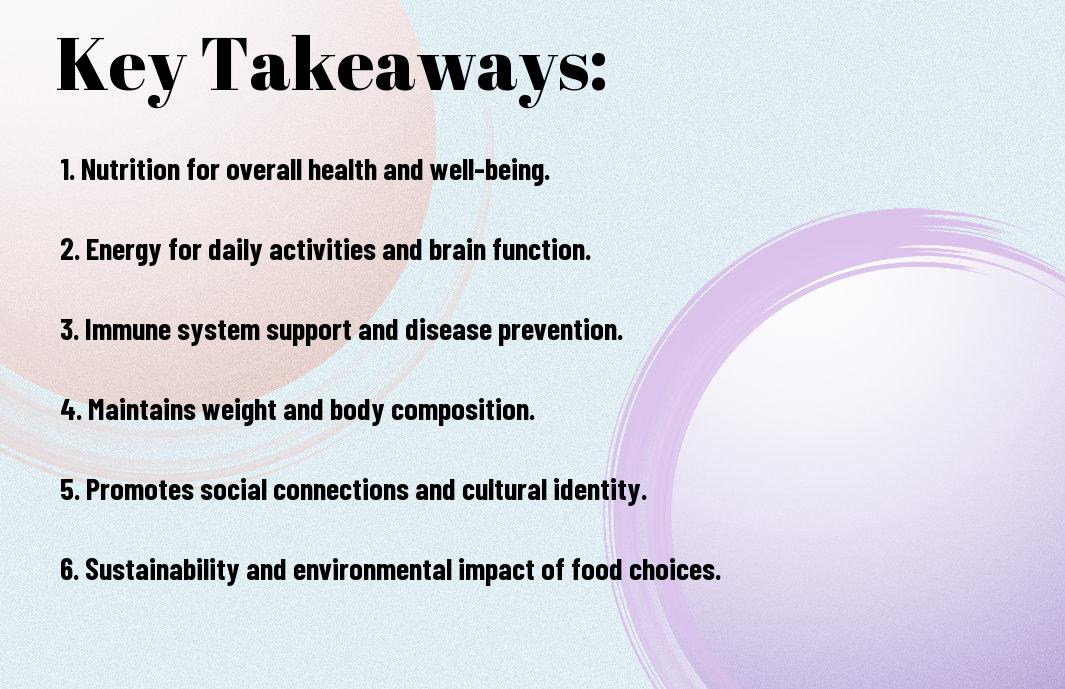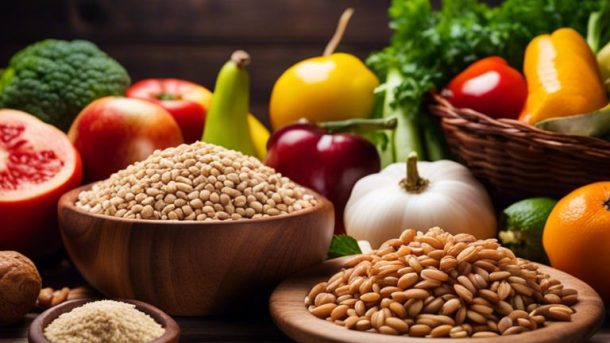Just like Michael Pollan has famously said, “you are what you eat.” The food you choose to put in your body has a direct impact on your overall health and well-being. From providing necessary nutrients for growth and development to influencing your mood and energy levels, the importance of food for life cannot be overstated. To learn more about how food plays a crucial role in your life, check out Newsletters: The Importance of Food in Our Lives: Finding ….
Key Takeaways:
- Health Benefits: Food is important for life as it provides imperative nutrients for our body to function properly and stay healthy.
- Social and Cultural Significance: Food plays a crucial role in bringing people together, sharing experiences, and celebrating different cultures through food traditions.
- Economic and Environmental Impact: The food industry affects economies and the environment, highlighting the importance of sustainable practices for long-term well-being.

The Significance of Food in Our Lives
Food as a Source of Energy
On a fundamental level, food is crucial as it provides your body with the energy it needs to function. The calories in the food you consume are converted into energy that fuels your daily activities, from walking and talking to more strenuous tasks like exercising. Without an adequate intake of food, your body wouldn’t have the fuel it needs to carry out these crucial functions.
Food as a Key to Good Health
Significance of food extends beyond just being a source of energy; it is also crucial for maintaining good health. The nutrients in the food you eat play a vital role in supporting various bodily functions and processes. A balanced diet rich in vitamins, minerals, and other crucial nutrients is key to preventing diseases, supporting your immune system, and promoting overall well-being.
To prioritize your health and well-being, it’s crucial to pay attention to the quality and variety of foods you consume. By making mindful choices and opting for nutrient-dense foods, you can truly harness the power of food as a key to good health.

The Impact of Food on Our Well-being
Some say that the food you eat plays a crucial role in determining your overall well-being. The nutrients and compounds found in different types of food can have a profound impact on your physical health, mental health, and overall quality of life. By understanding how food affects your body and mind, you can make informed choices that support your well-being.
The Connection Between Food and Mental Health
Connection between food and mental health is undeniable. Your brain requires a variety of nutrients to function properly, and deficiencies in key vitamins and minerals can contribute to mental health issues such as depression and anxiety. Eating a balanced diet rich in fruits, vegetables, whole grains, and lean proteins can help support your mental health and emotional well-being.
The Role of Food in Preventing Chronic Diseases
With the rise of chronic diseases such as heart disease, diabetes, and cancer, understanding the role of food in preventing these conditions is more important than ever. The foods you choose to eat can either protect you from or predispose you to these diseases. By consistently consuming a diet high in processed foods, sugars, and unhealthy fats, you may be increasing your risk of developing chronic diseases.
For instance, diets high in trans fats and refined sugars have been linked to an increased risk of heart disease and type 2 diabetes. On the other hand, diets rich in fruits, vegetables, whole grains, and healthy fats can help protect against these conditions and promote overall health and well-being.
The Importance of Nutrient-Dense Foods
Now, let’s explore the significance of incorporating nutrient-dense foods into your diet. These foods are packed with imperative vitamins, minerals, and other nutrients that are vital for your overall health and well-being. By choosing nutrient-dense foods, you are fueling your body with the necessary components to thrive and function at its best.
The Benefits of Whole Grains
For a moment, consider the benefits of whole grains in your diet. Whole grains like brown rice, quinoa, and oats are rich in fiber, which helps maintain a healthy digestive system and keeps you feeling full and satisfied. Additionally, whole grains provide important nutrients like B vitamins, iron, and magnesium, which are imperative for energy production and overall vitality.
The Power of Fresh Fruits and Vegetables
The power of fresh fruits and vegetables in your daily meals cannot be overstated. These colorful foods are packed with antioxidants, vitamins, and minerals that support your immune system and help protect your cells from damage. By including a variety of fresh fruits and vegetables in your diet, you are not only nourishing your body but also reducing your risk of chronic diseases like heart disease, diabetes, and certain cancers.
Fresh fruits and vegetables are also incredibly versatile and can be enjoyed in a multitude of ways – whether raw, steamed, roasted, or blended into delicious smoothies. By incorporating a rainbow of produce into your meals, you are not only enhancing the flavor and texture of your dishes but also reaping the numerous health benefits they offer.

The Consequences of a Poor Diet
Many health issues can arise from a poor diet, impacting both your physical and mental well-being. Two significant consequences of a diet lacking in nutrition are the rise of obesity and related health issues, as well as the harmful impact of processed foods on your overall health.
The Rise of Obesity and Related Health Issues
An unhealthy diet high in processed foods, sugar, and unhealthy fats can lead to weight gain and the development of obesity. Obesity is a significant risk factor for a range of health issues, including diabetes, heart disease, stroke, and certain types of cancer. By consistently consuming foods high in empty calories and low in important nutrients, you are putting yourself at risk of developing chronic conditions that can significantly impact your quality of life.
The Impact of Processed Foods on Our Health
Processed foods are often loaded with additives, preservatives, unhealthy fats, and high levels of sugar and salt. These ingredients can have detrimental effects on your health, including weight gain, inflammation, digestive issues, and an increased risk of developing chronic diseases. By relying heavily on processed foods in your diet, you are depriving your body of the vital nutrients it needs to function optimally.
Impact: It’s important to be mindful of the impact that processed foods can have on your health. By reducing your intake of processed foods and opting for whole, nutrient-dense foods instead, you can better support your overall well-being and lower your risk of developing diet-related health issues.
The Role of Food in Building Strong Communities
Despite the fast-paced modern lifestyle, food remains at the heart of building strong communities. The way we grow, distribute, and consume food has a direct impact on our health, environment, and economy. By understanding the pivotal role of food in community development, you can make informed choices that benefit not only yourself but also the society you live in.
The Importance of Local Food Systems
Communities thrive when they have access to locally sourced, fresh food. Local food systems promote sustainability by reducing the carbon footprint associated with food transportation. By supporting local farmers and producers, you not only get access to nutritious and flavorful food but also contribute to the economic development of your community.
The Benefits of Community-Supported Agriculture
On a deeper level, participating in Community-Supported Agriculture (CSA) programs can strengthen community bonds. By investing in a CSA share, you not only receive a regular supply of fresh produce but also forge a direct connection with the farmers who grow your food. This direct relationship fosters trust, transparency, and a sense of communal purpose around sustainable food practices.
Building strong communities through food not only ensures the availability of fresh and healthy options but also promotes social cohesion and environmental stewardship. By actively engaging with your local food system and supporting community initiatives, you contribute to a more resilient and vibrant society where everyone has access to nourishing food options.
The Environmental Impact of Food Production
Keep Our Story | Food For Life | Organic, Non-GMO, Sprouted … in mind when considering the environmental impact of food production. Food production plays a significant role in the health of our planet. The way food is grown, harvested, processed, and distributed has far-reaching consequences on the environment. Industrial agriculture, which focuses on mass production and often utilizes harmful chemicals, contributes to deforestation, soil erosion, water pollution, and loss of biodiversity.
The Effects of Industrial Agriculture on the Environment
Environmentally, industrial agriculture has major implications. Mono-cropping and the use of synthetic fertilizers and pesticides deplete the soil of imperative nutrients, leading to decreased soil fertility and increased erosion. The excessive use of water in crop irrigation for large-scale farming depletes water sources and contributes to water scarcity in many regions. Furthermore, chemical runoff from industrial farms contaminates waterways, affecting aquatic life and posing risks to human health.
The Importance of Sustainable Food Practices
Production decisions matter when it comes to food and the environment. Embracing sustainable food practices is crucial for reducing the environmental impact of food production. Sustainable agriculture focuses on methods that promote soil health, conserve water, and protect biodiversity. By choosing organic, non-GMO, and locally sourced foods, you support farmers who prioritize sustainable practices that nurture the earth and its ecosystems.
Environmental
It’s important to be mindful of your food choices and their environmental implications. Opting for food products that align with sustainable practices can help reduce your carbon footprint and contribute to preserving the planet for future generations. By supporting brands like Food For Life that prioritize organic, non-GMO, and sprouted ingredients, you actively participate in promoting a healthier and more sustainable food system.
Summing up
To wrap up, food is not just a source of physical nourishment but also plays a significant role in cultural, social, and emotional aspects of our lives. By understanding the importance of food for life, you can make more informed choices about what you eat, leading to better health outcomes and a deeper appreciation for the food on your plate. Bear in mind, food is not just fuel for your body; it is a reflection of your values, traditions, and connections with others.
FAQ
Q: Why is food for life important?
A: Food for life is important because it provides the necessary nutrients and energy our bodies need to function properly. It also plays a crucial role in maintaining good health and preventing diseases.
Q: How does food for life impact overall well-being?
A: Consuming a balanced and nutritious diet contributes to improved physical and mental well-being. It can enhance mood, boost energy levels, and support a healthy immune system, leading to a better quality of life.
Q: What are the benefits of choosing healthier food options?
A: Opting for healthier food choices can help in weight management, reduce the risk of chronic illnesses such as heart disease and diabetes, improve digestion, and promote longevity. It can also improve skin health and overall vitality.



